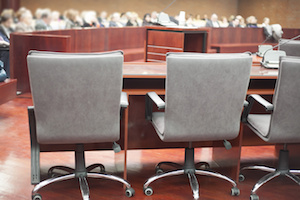In the continuing wrongful death trial filed by family members of a man killed when a passenger airplane crashed into his home, attorneys for the defendants suffered a blow this week when the federal government forbid access to a forensic expert witness. Litigants who wish to use expert witnesses employed by the federal government must satisfy specified requirements, and attorneys for Continental Airlines were unable to meet the threshold in this case.
Wrongful Death Trial for Airplane Crash Victim Continues
The family of Douglas Wielinski, who was killed when Continental Airlines Connection Flight 3407 crashed into his home, filed a wrongful death lawsuit against the airline. As we posted last month, a significant portion of the Wielinski’s damage claim hinges on the family’s contention that Douglas did not die immediately, but suffered through the post-crash fire that trapped him in the home. Under wrongful death law, family members may recover extra damages when a victim suffers between the moment of the accident and the time of their death, and the Wielinksi’s are scheduled to use forensic expert witnesses who will testify that Douglas’ autopsy suggests he was still alive after Flight 3407 crashed.
Defense attorneys who represent Continental Airlines have countered with their own expert witnesses who have planned testimony that suggests Mr. Wielinski was killed immediately. The defense encountered a setback, however, when a forensic anthropology expert witness who had worked the scene of the crash was blocked from testifying by the US Department of Health and Human Services.
Federal Agency Blocks Forensic Expert Witness Testimony
Attorneys for the defendants identified Dr. Dawnie Steadman, currently the director of the Forensic Anthropology Center at the University of Tennessee at Knoxville, who was part of a group of anthropologists called to the site of 3407’s crash to help identify victim remains. Dr. Steadman is a forensic expert witness with experience in several other victim identification operations, including the 9/11 World Trade Center attacks. Defense attorneys intended to ask Dr. Steadman to testify that Wielinski’s remains suggested he died upon impact rather than suffer.
Dr. Steadman’s expert testimony hit a snag, however, when the US Department of Health and Human Services refused her involvement in the case. Although Dr. Steadman is a private citizen, and was at the time of the crash, the forensic anthropologists used to identify victim remains that she was a part of worked under the Disaster Mortuary Operational Response Team (DMORT). DMORT is a team under the authority of the Department of Health, and, as such, Dr. Steadman’s work at the scene of the 3407 crash comes under the umbrella of federal government authority.
In order to obtain testimony from an expert witness whose work is regulated or overseen by a federal government agency, attorneys must meet the criteria outlines in the Touhy Regulations for expert testimony.
Touhy Regulations for Expert Testimony
The Touhy Regulations of expert witness testimony are in place to prohibit unauthorized release of information by current or former agency employees. Each federal government agency conducts a Touhy review before authorizing use of an expert witness whose work was under its supervision. When making a Touhy decision, agencies consider a number of factors, including:
- How badly the litigants need the expert witness in question
- Whether or not the testimony serves the public interest
- Whether or not the expert’s information is privileged
- How releasing the expert testimony fits with the agency’s mission
Each agency is given significant discretion in its Touhy review, and when the United States is not a party to the litigation, it is unlikely that an expert witness subject to Touhy regulations will be permitted to testify. Should litigants find their need for the disallowed expert testimony to be dire, it is possible to request a court intervene and subpoena the witness. In this case, defense attorneys for Continental elected to simply replace Dr. Steadman with another forensic expert witness rather than appeal the Department of Health’s Touhy decision.




